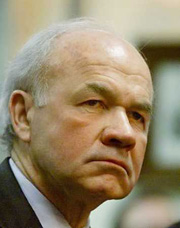 Former
Enron Corp. Chairman and Chief Executive Kenneth Lay, who grew the
company into an energy trading giant that became the ultimate symbol
of corporate wrongdoing and greed, was indicted
on Wednesday and said he would surrender to authorities. Former
Enron Corp. Chairman and Chief Executive Kenneth Lay, who grew the
company into an energy trading giant that became the ultimate symbol
of corporate wrongdoing and greed, was indicted
on Wednesday and said he would surrender to authorities.
Lay said in a statement issued Wednesday afternoon he had been
indicted and would surrender on Thursday morning. Sources earlier
said a federal grand jury returned
a sealed indictment with undisclosed
criminal charges for Lay's actions before the company fell into
bankruptcy in December 2001.
On Thursday, Lay is to follow a well-worn
path for former Enron executives: surrender to the FBI and
then make his initial appearance before a federal magistrate
judge.
"I have been advised that I have been indicted. I will surrender
in the morning," Lay said. "I have done nothing wrong,
and the indictment is not justified."
Houston-based Enron was the nation's seventh largest publicly owned
firm when it unraveled in the final
months of 2001 amid disclosures that it had used off-the-books
deals to hide billions in debt and falsely inflate profits.
Lay, 62, has steadfastly denied
any wrongdoing.
Separately, the U.S. Securities and Exchange Commission plans to
file civil fraud charges against Lay in Houston on Thursday morning,
a source familiar with the matter said.
Lay, once a leading U.S. industrialist and close friend of President
Bush -- who called him "Kenny Boy" -- now faces felony
charges stemming from the Enron debacle.
The charges come 2.5 years after the U.S. Justice Department began
an investigation which has slowly climbed the corporate ladder to
bring criminal charges against 22 former Enron employees.
Former Chief Financial Officer Andrew Fastow pleaded guilty in
January and is cooperating with prosecutors who were aiming higher
up the corporate ladder.
He helped prosecutors bring charges against Lay's handpicked
successor, Jeff Skilling, who unexpectedly quit in August 2001,
six months after becoming CEO.
The fall of Enron touched off investigations
that uncovered widespread financial fraud in corporate America and
was followed by scandals that brought down giants such as accountancy
Arthur Andersen, telecoms giants WorldCom Corp., now MCI, and GlobalCrossing
and HealthSouth Corp.
Those bankruptcies and charges of criminal behavior in the boardroom
eroded consumer confidence and helped send world stock markets into
a yearlong tailspin. In the wake
of the scandals, strict new federal laws on corporate governance
were enacted.
In a recent interview with the New York Times, Lay accepted responsibility
for Enron's demise, but said he had
committed no crimes.
He said Fastow, the architect of Enron's financial house of cards,
was largely to blame for the company's troubles.
"At our core, regrettably, we had a chief financial officer
and a few other people who, in fact, mismanaged the company's balance
sheet and finances and enriched themselves in a way that once we
got into a stressful environment in the marketplace, the company
collapsed," Lay told the Times.
Legal experts said that defense might not win over a jury, especially
in Houston, where thousands of people were affected by the company's
collapse.
Lay, as head of then Houston Natural Gas, led a 1985 merger that
formed the modern Enron.
He became an aggressive political player who lobbied lawmakers
such as Bush and his father, former President George H.W. Bush,
to deregulate natural gas markets.
Generous campaign donations -- at one time he was the current President
Bush's top contributor -- helped gain access to the halls of power.
Enron used deregulation to become a dominant force in electricity
trading in the 1990s and served as a role model for dozens of other
firms that mimicked its no-holds-barred
trading practices.
But the burgeoning merchant power industry imploded after Enron's
collapse and the California power crisis of 2000-2001.
Lay was Enron's chief executive for most of the company's history,
but handed the post to Skilling in February 2001.
Skilling suddenly resigned in August 2001 Lay resumed as CEO until
he quit in January 2002.
Lay told the Times his personal fortune once stood at 0 million,
but had dropped below million because most of his holdings were
in now worthless Enron stock.
|
